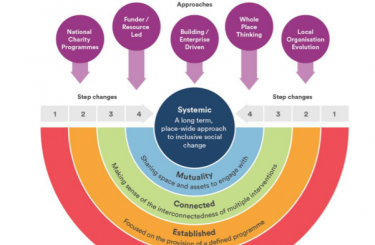Related


Yesterday saw the launch of ‘Levelling up our communities’ – a policy paper written by Danny Kruger MP, containing proposals to sustain the community spirit the nation saw during lockdown. We were one of the 500+ organisations who fed back what we have learnt from the crisis, and in this blog, we’re looking at what he has said about our three specific recommendations on place-based giving, funder collaborations and flexible funding.
What we said:
We knew the power of people, partnerships and place before the crisis, but reliance on local ecosystems of support for communities has never been more evident than during this time of crisis.
We knew the power of people, partnerships and place before the crisis, but reliance on local ecosystems of support for communities has never been more evident than during this time of crisis. Our work in place through the London’s Giving movement over the last six years (summarised in a report launched in May) has seen examples from 20 local areas in London that bring together councils, businesses, charities and communities to tackle the issues they face together… The government, through DCMS, has recently supported pilot projects across the UK based on these approaches, and we could encourage continued investment in these areas and beyond to create the opportunity for cross-sector partnerships to flourish, and for local communities to be centred as part of this key local infrastructure, supporting the social and cultural fabric of our places.”
What he wrote:
While place-based giving schemes were not specifically referenced, their aims and spirit of collaboration were definitely included and apparent throughout the report. In fact, you can barely turn a page without seeing both ‘place’ and giving’. We were especially pleased to see proposals that national Government should place a far greater emphasis on place-based policymaking. This is on top of supporting both physical and social infrastructure for communities (especially the functions of a CVS), and growing local ‘social capital’ generally. Reflecting the principles of London’s Giving, all kinds of ‘giving’ are encouraged in the report, covering not only money, but time and resources.
Enabling funder collaboration, including through aligning government funding with regional or local partnerships, would create the opportunity for resources to shift to communities
What we said:
“We believe funding is most effective when funders collaborate across sectors, working strategically across systems to target resources. Enabling funder collaboration, including through aligning government funding with regional or local partnerships, would create the opportunity for resources to shift to communities who are best-placed to understand how to use them.”
What he wrote:
In his introduction, Danny Kruger sets out a vision for the government to be more collaborative with funders and civil society: “We should act speedily, but collaboratively, to put communities at the centre of the national recovery and the great mission of levelling up our country.” He also advocates for national funders to take the lead in local and regional funder collaborations, and finds that ‘place’ is a lens that enables decision-makers to see that “one size does not fit all”. We particularly welcome the proposed Levelling Up Communities Fund, using £2bn of dormant assets, which sounds rather similar to the Community Wealth Fund (we’re a founding member of the Community Wealth Fund Alliance).
Much of the approach funders have taken during this time could be replicated outside of the crisis, and we encourage greater flexibility in the government’s approach to funding to enable this to happen.
What we said:
“We have seen the most effective responses from civil society and communities where power has been placed in their hands, trusting them to do what is needed at the time, using resources effectively to meet needs and to enable people to thrive. Much of the approach funders have taken during this time could be replicated outside of the crisis, and we encourage greater flexibility in the government’s approach to funding to enable this to happen.”
What he wrote:
Of all our three ‘asks’, this is picked up as the strongest theme in ‘Levelling up our Communities’. In the first paragraph of the chapter on ‘power’, Danny Kruger makes a bold statement referring to trust-based, more flexible relationships: “The new social model we need - more entrepreneurial, more trusting, and with opportunity levelled up across the country - requires a great transfer of power and wealth to our communities”. Throughout the report, there are signals that he recognises that the Government needs to ‘get its own house in order’ – looking even further than funding, he urges the Department of Work and Pensions to have far more flexible systems when designing their employment support programmes.
Overall, we are pretty happy with the report, as it seems is the rest of the sector. However, the proof is in the pudding of whether its recommendations are taken up by Government. The Prime Minister has thanked Danny Kruger for the report and said that he ‘looks forward to continuing the conversation’. Let’s see if the spirit of giving, collaboration and flexibility are picked up by the Government soon – six months on, it is clear that this crisis is not going away.
Click here for our original submission.

